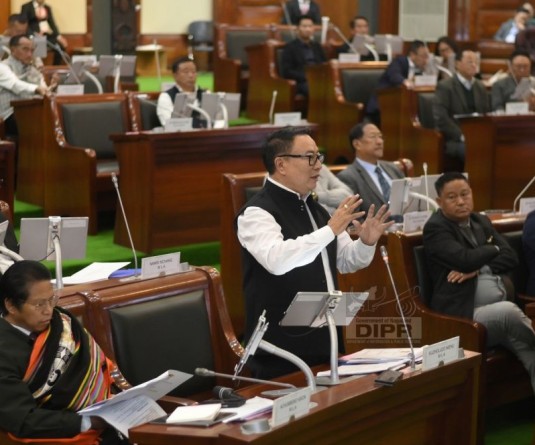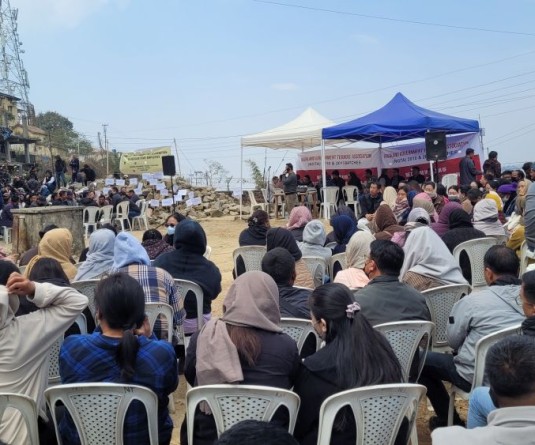
Our Correspondent
Kohima | March 18
Kohima | March 18
State Level Master Trainer and Coordinator for Natural Disaster Management ATI Nagaland, Dr. Hovithal Sothu today asserted that self regulation by political parties, candidates and media houses is the ultimate solution to address the issue of paid news. He stated this while addressing a training programme on ‘Paid News’ at the office of the Chief Elector Officer, Nagaland (Media Cell) on Tuesday. He called upon the trainees to stay informed about the regulatory mechanism and consequences regarding paid news. To the media persons, he requested, “let us work together for clean and free elections.”
Representatives from the electronic and print media, and political parties- Naga People’s Front (NPF), BJP and JD (U), attended the training.
Dr. Sothu said that paid news tries to evade election expenditure laws/ceilings, causes undue influence on voters and affects their right to information. There is circumstantial evidence, but not much clinching proof, as charges are promptly denied by both sides, he said.
The ECI has appointed a Media Certification & Monitoring Committee (MCMC) at state and district levels to scrutinize all media within its jurisdiction, to identify political advertisements in the garb of news. MCMC shall also actively consider paid news cases referred to it by the Expenditure Observers.
Dr. Sothu informed that publishing and abetting the publishing of paid news is an electoral offence, with punishment of a minimum of 2 years imprisonment.
Regarding advertisements in media, MCMC shall check, if the same is with the consent or knowledge of the candidate. If it is done with the candidate’s knowledge/consent, it will be accounted for in the election expenses of the candidate. If not, then action may be taken for prosecution of the publisher for violation of Section 171H of the IPC.
If any election pamphlet, poster, handbill and other document does not carry name and address of the publisher, as required under Section 127A of RPA 1951, action can be taken against the defaulters, he said.
The State level MCMC shall dispose the case within 96 hrs of receipt of appeal, and convey the decision to the candidate, with a copy to the District level MCMC.
The Candidate may appeal against the decision of the state level MCMC to the ECI, within 48 hours of receiving of order from the committee. Following this, the decision of the ECI shall be final.
WHEN CAN ONE SUSPECT PAID NEWS?
• Identical articles with photographs & headlines appearing in Newspapers carrying by-lines of different authors around the same time.
• On the same page of specific newspapers, articles praising candidates with comments such as “likely to win.”
• News item stating that a candidate is getting the support of all sections of society & that would win.
• News items favoring a candidate, not carrying any byline.
• Newspaper publishing a banner headline stating that a party/candidate is ready to create history in the state/constituency but not carrying any news item related to this headline.
• News item saying that the good works done by a Party/Candidate had marginalized the electoral prospects of the other party/candidate in the state with all sentences of the news item in favor of the party/candidate.
• Instances of fixed size news items, with a double-column photo. News items are seldom written in such a rigid format & size, whereas advertisements are most often.
• In specific newspapers, multiple font types & multiple drop case styles were noticed within the same page of a single newspaper. Such things happen because –layouts, fonts, printouts, photographs – were provided by candidates who paid for slots in the newspaper.
• Identical articles with photographs & headlines appearing in Newspapers carrying by-lines of different authors around the same time.
• On the same page of specific newspapers, articles praising candidates with comments such as “likely to win.”
• News item stating that a candidate is getting the support of all sections of society & that would win.
• News items favoring a candidate, not carrying any byline.
• Newspaper publishing a banner headline stating that a party/candidate is ready to create history in the state/constituency but not carrying any news item related to this headline.
• News item saying that the good works done by a Party/Candidate had marginalized the electoral prospects of the other party/candidate in the state with all sentences of the news item in favor of the party/candidate.
• Instances of fixed size news items, with a double-column photo. News items are seldom written in such a rigid format & size, whereas advertisements are most often.
• In specific newspapers, multiple font types & multiple drop case styles were noticed within the same page of a single newspaper. Such things happen because –layouts, fonts, printouts, photographs – were provided by candidates who paid for slots in the newspaper.






